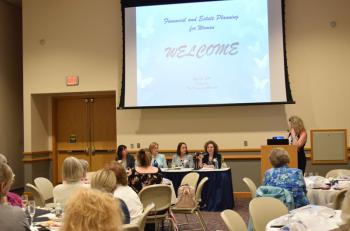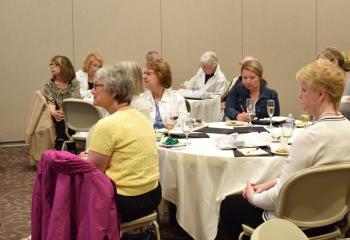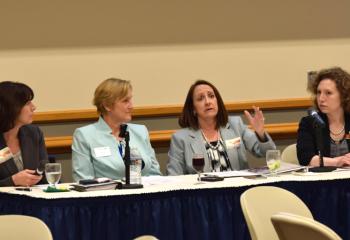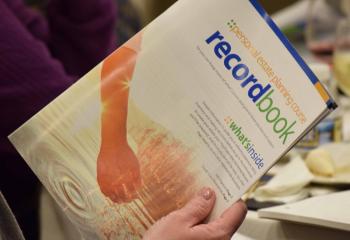By TAMI QUIGLEY Staff writer
“Learn not to be afraid,” Beth Dobis Beers, Esq., said of consulting a financial or estate planner. “People think they don’t have enough money. The whole point of us being here is even if you have $500 in the bank, you can maybe turn it into $5,000. Make the first step – talk to a financial or estate planner.”
Beers was one of four panelists at the complimentary information presentation “Financial and Estate Planning for Women” offered by the Diocese of Allentown May 15 at DeSales University, Center Valley.
Useful financial information, laughter, fellowship and lively discussion came together at the evening event, the first in a series of free roundtable discussions and special presentations in finances and estate planning launched by the Diocese of Allentown.
The session addressed such questions as: When you think about the life you want and deserve for your family does it seem overwhelming to create a financial plan that takes all your future expenses into account? Are you feeling unprepared to make important financial decisions?
A panel of female financial and estate planning experts shared answers women need to make smart decisions about their financial future.
The panel included Beers of Bath; Denise Hozza, accountant with Concannon Miller, Bethlehem; Sheri Leo, vice president and manager, Charities and Endowment Groups from Fulton Financial, Bethlehem; and Claudia Wert of Wert Investment Consulting Group of Wells Fargo Advisors, Wyomissing.
Ginny Downey, major and planned gifts officer with the Diocesan Secretariat for Stewardship and Development, facilitated the roundtable discussion. Julie Scheck, director of advancement, Catholic Charities, Diocese of Allentown, fielded questions from the audience to the panel.
Wert noted that woman comprise 50.8 percent of the U.S. population, and nine out of 10 women eventually take control of the family finances.
She explained acting as a fiduciary means putting the client’s best interests first. Wert said a financial advisor works with a portion of a person’s financial situation, while a financial planner works with the entire situation.
Speaking about the best way to clarify your financial goals, Beers encouraged women to keep track of what they have.
“Make a list of everything at every stage of your life,” Wert said. She spoke of a client who has four 401K’s from different jobs and wants to roll them into one, but is having trouble finding them all.
Hozza spoke of the importance of gifting, suggesting if a person has the money and wants to give it, for example, to her child who needs the money or directly to charity, it can be done while the person is still alive.
“Planned giving is a way to give and support causes near and dear to your heart, such as Catholic causes or other charities,” Beers said. “You can do it now and see the good it does. A charity can also be a beneficiary of your life insurance policies. You do get tax benefits at different stages of the game.”
“Sit down and say, ‘what’s important to me’ and consolidate your list of beneficiaries,” Wert said.
Hozza underscored the importance of reviewing your life insurance, and shared the story of a client who succumbed to cancer without changing his beneficiary, so all his money went to his ex-wife.
Wert said it’s important to have a power of attorney, as in the case of a 58-year-old man who unexpectedly had a stroke and needed someone to be his agent.
“The power of attorney is more important than the other documents,” Beer said. “You’re laid up for six weeks and need someone to be you when you can’t, and continue all the day-to-day things until you are back on your feet.”
Beers said it’s also important to have an alternate power of attorney in case something happens to the person who was selected.
Beers also said to think about estate and financial planning when big things happen in your life, such as divorce or having grandchildren.
Leo said “Women need to be aware of what’s happening” with their financial and estate planning, noting for example widows who are left with no idea of what they have because their spouse handled all their financial issues.
The panel concurred it’s important for couples to be on the same page, to know their financial situation and where documents are kept. Panelists agreed it’s important to have a power of attorney, a will and a living will.
Wert said the power of attorney should be included in every financial meeting so they know what’s going on.
“Get your documents from an attorney, not online, because they are general documents online and the forms often change,” Beers said.
“There are so many moving parts and documents. Your lawyer, financial advisor, CPA – any professional in your life – should be in communication,” Wert said.
Discussing the importance of having a power of attorney, Beers painted a scene of a woman being in the hospital and someone has to sign for her to go to another facility for physical therapy. “You want your son to sign, but if your son isn’t your power of attorney, the hospital may not let him sign.”
Turning to the subject of a living will, Beers said, “The Diocese of Allentown has beautiful language to incorporate into a living will that makes it clear what your wishes are.” The information can be found by clicking here.
The panel agreed to be more financially independent, maximize your 401K plan, come up with a list of your goals and discuss them with a financial planner, and review your financial plan regularly and stick to it.
How to find a financial planner or advisor you trust? Panelists said meet someone in person and see if you make a connection, look around, and ask other people who they have.
Suggestions from the audience included check with fellow parishioners to see who they use as a financial advisor and consider working with the financial advisor to your parish council. Another suggestion was to visit www.investopedia.com to aid your financial literacy.
Leo noted a broker fee should not exceed 1 percent.
Beers said if you have a new will, it revokes any former will. “It’s the last date that counts.”
“If you have young children the most important part of the will is who will be their guardian if something happens to you,” Beers said.
The evening included refreshments and door prizes and, most important, useful information and lively discussion for women interested in strengthening their future financial outlook.











